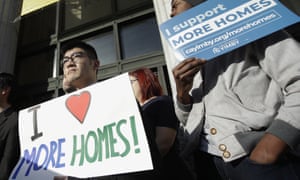SB50 would have overridden zoning laws to allow small apartment buildings in single-family-home neighborhoods

Photograph: Jeff Chiu/Associated Press
California lawmakers have failed to pass the most ambitious proposal yet to combat a growing housing crisis, voting down legislation on Wednesday that would have eliminated zoning restrictions near transportation and job centers to enable the construction of more high-density housing.
California faces a crippling housing crisis that has driven up rents and led to a surge in homelessness. Senate Bill 50 (SB50) was meant to address an estimated shortage of 3.5m homes, overriding local zoning laws in order to let developers build small apartment buildings in neighborhoods reserved for single-family homes.
The bill failed to pass on Wednesday by three votes. However, the California state senate voted to give it “reconsideration”, meaning lawmakers could vote on it again on Thursday. The deadline for the bill to pass is Friday, but the state senate is not scheduled to meet that day.
The bill was authored by state senator Scott Wiener, a Democrat from San Francisco, home to some of the highest housing prices in the country.
“We’re going to do everything in our power to pass SB50 tomorrow,” Wiener told reporters after the vote.
Wiener had been working on the measure since last year, saying lawmakers “have a responsibility to take bold action to make people’s lives better by ensuring we have enough housing for everyone who needs it”.
“Restrictive zoning puts a hard cap, full stop, on our ability to build enough housing to get out of this crisis,” Wiener said.
Less than a quarter of the developable land in much of California is zoned for multifamily housing. That lack of space for new affordable housing combined with the sprawl of single-family homes has led to high housing costs, community displacement and a growing number of super commuters – people who commute upwards of hundreds of miles to work a day because they can’t afford to live near their jobs.
But Weiner was unable to overcome strong opposition from local governments, including the influential League of California Cities, that said the bill would “greatly undermine” their authority to regulate growth.
Critics also argued that the majority of housing units created by SB50 would be sold at market-rate – a cost that’s simply unaffordable for the majority of people in need in the area.
“None of these units are going to be subject to rent control,” Deepa Varma, the executive director of the San Francisco Tenants Union, said ahead of the vote. “It doesn’t create housing that’s going to house the homeless, it doesn’t stabilize the people who are already there, it doesn’t encourage the units that are going to be built to get cheaper.”
Supporters in the senate, such as Democratic senator Ben Hueso of San Diego, were motivated by the state’s high cost of living and housing shortage.
“I don’t know how people can afford to live in our state,” Hueso said. “I can’t explain why we don’t have a greater supply of apartments under construction.”
But opponents, such as Democratic senator Harry Stern from Calabasas, worried the bill would increase building in areas prone to wildfires, which have become larger and more frequent in recent years because of climate change.
“What we are going to be doing is burning more and more Californians’ homes down the more we build down there,” said Stern, who lost his home in a devastating 2018 wildfire in southern California.
Wiener had changed the measure to give local governments two years to come up with their own housing plans that could have exempted cities from many of the law’s requirements. But it wasn’t enough for approval in the senate.
California’s governor, Gavin Newsom, who supports the bill, said he was not giving up.
“We’re going to get something big done this calendar year, this legislative session,” Newsom told reporters. “We are going to continue to work aggressively to address production in this state.”
Its demise highlights the difficulty of passing major housing legislation in California. Many of lawmakers’ most sweeping ideas have failed to pass the legislature. An exception was a new law that took effect in January that limits rent increases for many properties to 5% a year plus inflation.
Source: US Politics - theguardian.com



